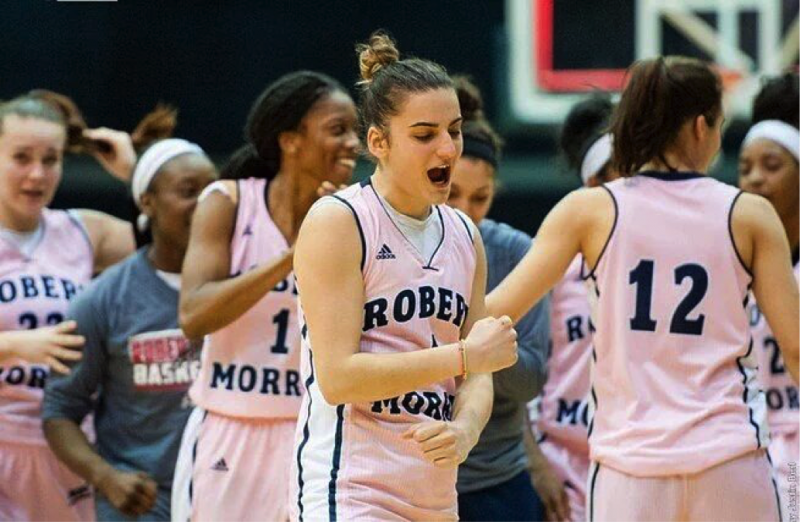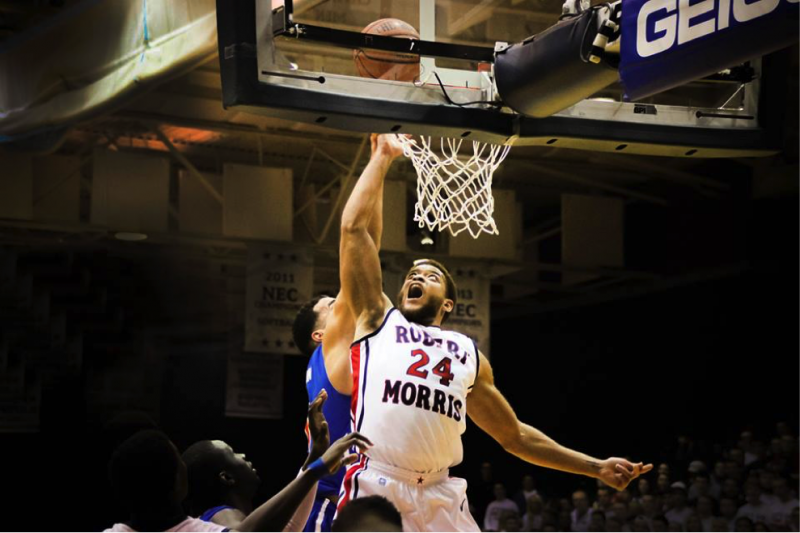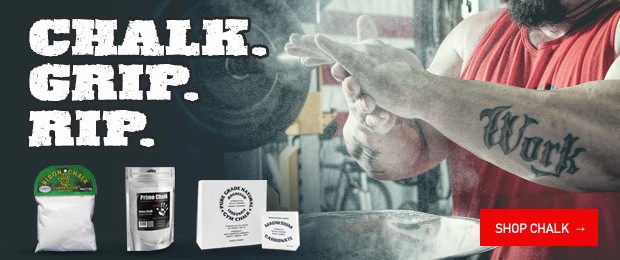
Last month I wrote an article about knowing your athletes and how we're all trying to reach them and understand what makes them perform better in the weight room. This month, it's time to look in the mirror to see if we're actually making an impact. I contacted two of my former athletes and asked them to tell me what they had learned in the weight room. I know what I hoped they had learned, but I wanted to see if any of those lessons stuck with them.
Photo courtesy of Anna Niki Stramolampro
Anna-Niki Stramolampro
The first athlete I reached out to was Anna-Niki Stramolampro, a former women's basketball player. A native of Thessalonki, Greece, Anna-Niki came to us five years ago. At the time, we had another Greek player who was in the middle of the greatest career of any women’s basketball player in school history (Artemis Spanou). Clearly, Anna-Niki had big shoes to fill. In addition to this, she was as weak as a kitten. Anna-Niki worked hard but had never experienced training like ours. In her four years with us, she had amazing athletic success. She was named conference player of the year in her senior year. She was twice conference tournament MVP and went to four straight championship games and three NCAA tournaments.
RECENT: Know Your Audience: Learning More About Your Athletes
With all these accomplishments, I wondered what she had learned from the weight room. This really interested me, because this year she started playing professionally in Europe and has had a trying year. She had a few injuries, played for more than one team, and hasn’t been on a team that is winning. Being aware of all the adversity that she is currently facing that she didn't face in college, I wondered if the weight room and its lessons had helped prepare her. After reviewing her points, I realized that while there is a lot more we could do, I believe we can count this one athlete as a win. I'll let her tell you in her words:
Walking into a weight room, all you see is pull-up bars, benches, plates, bands, dumbbells, and many other little or big things that have one thing in common: to help you reach your goals, whatever those might be. A weight room with the assistance and guidance of a great strength and conditioning coach will definitely teach you a lot. The number one thing that most people say they learned in the weight room is "I learned how to be stronger." But I would like to take that a step further and take a deeper look at those lessons that a coach and a weight room taught me.
Based on my personal experience, the demands of being a Division I basketball player are high. When rookies walk into a college weight room, they immediately understand that lifting is not the same anymore. To be able to compete at a high level, you have to be physically fit. In my case, I was lucky enough to work with a great strength and conditioning coach who was on top of things and was willing to take the time to work with each individual and make them stronger, faster, and more explosive. Most importantly, my strength coach and the weight room taught me much more than correct techniques for the front and back squat or how to do overhead presses and snatches.
Here are some things that I learned inside the RMU weight room working with Todd Hamer:
Nobody is perfect and it’s totally fine.
All of us have different strengths and weaknesses. That’s absolutely normal, and that’s the reason why we work with a coach in a weight room. A strength coach recognizes both our strengths and weaknesses, and he is there to help us continue to develop our strengths and slowly improve our weaknesses. There isn't any reason to feel less capable because you aren't explosive or as strong as the person working right next to you. When I first walked into the weight room, both my coach and I knew that I wasn’t the strongest player on our team. Guess what? I never became the strongest one, but I worked hard to get stronger and become the strongest that I could be. If every player on a team works like that, everybody will get better, and the team will see their hard work paying off on the field or on the court.
Set small goals and be patient.
Another lesson I was taught in the weight room was to set goals and work daily to achieve them. If you have a hard time setting a goal in the weight room, ask your coach. He will help you for sure. However, remember that results don’t come overnight. You won’t get stronger or faster in a day, a week, or a month. Yes, you will see progress, but the results that you want are a product of long-term lifting. As a result, I learned how to set small goals and take it one day at a time. As soon as I felt like I had achieved my first goal, I would set a new one.
You need mental toughness.
Being physically fit is great, but learning how to be mentally tough is very important, and a weight room will definitely help you develop this skill. There are days when you don’t feel like doing anything because you just have a bad day or because you're sore. That’s where mental toughness comes into play. A great strength and conditioning coach will teach you how to be mentally tough and challenge yourself when those days come. He will challenge you to do an extra rep when you feel like you can’t, to finish the last lap when your legs are tired, and to use the heavier dumbbells when you want to use the lighter. At the moment, you probably won’t like him because he puts pressure on you, but you need to understand that he motivates you, and he is there with you because he wants you to get better and succeed. You are in the weight room because you want to get better, and if you really want it, you will do it for yourself and your teammates. This mental toughness to continue to work hard even when you feel like you can’t will transfer on to the court.
Photo courtesy of Aaron Tate
Aaron Tate
The second athlete I reached out to was Aaron Tate, a former men's basketball player. Aaron played for us for four years and graduated two years ago. He came in as an undersized forward at six feet, four inches, and because of this, he had to be stronger than everyone else. He took the challenge on as well as almost any athlete I've ever had the honor of coaching. Aaron was a quiet worker. He rarely said much, but he came in every day ready to get after it. He didn't have the same level of success on the court as Anna-Niki, but he was able to go to one NIT tournament where he helped us beat the number one seed and move to the second round with only eight players on our team.
I reached out to Aaron because his work ethic and success in life are near the top of any athlete I've ever worked with, so I wanted to see if our lessons stuck with him. Here's what Aaron had to say about the lessons he learned in the weight room:
Toughness
I swear you used to pick out lifts that hurt the most. I swear that every time we would complain about something, the next time we did that lift, it would be more and more excruciating. But we still did them.
Respect
When I first started lifting, it wasn't the easiest thing. And it wasn't my favorite thing to do at times (with practice, classes, etc.). I grew to like it more and more because of the respect I had for you, what you do, and how you carried yourself every day.
Devotion
I knew that I was undersized and there wasn't too much I could've done about that. I did know two things that I could do to compensate for that: be smarter and be stronger than my opponent. I can say that devoting myself to lifting helped me help the team win a good number of games."
The day after I received Aaron's response to my question about whether or not the lessons in the weight room stuck with him, he texted me this message: "FYI, I was debating whether or not I was gonna start waking up and lifting in the morning because I never seem to have time in the afternoon to train. For three weeks I have contemplated if I wanted to wake up at 4:00 just to be at the gym to lift at 5:00 and be ready and at work by 7:00. When you texted me yesterday, you made my mind up for me. So thank you, cause I needed that push."
What can I or we as an industry learn from these two student-athletes and their thoughts on what we do in our weight room? I think Anna-Niki said it best: “Nobody is perfect and that’s totally fine.” I believe this statement, as well as Aaron, talking about how respect should be the foundation of what we do as a profession.
A few months ago, I posted a video of one of the athletes I train squatting. He had an "all you can eat" set. He squatted 425 for 10 reps, which was a good number for him. After I watched the video, I thought that he had good reps. They probably wouldn’t have passed at a USAPL meet, but they were close, and because I was the one spotting, I was fine with his depth. I tweeted the video because I was proud of this young man. Within a few days, there were hundreds of shares with people saying that we don’t squat correctly and that these squats wouldn’t count at school x, y, or z. My retort is simple: good for you and your depth. We are too busy working and improving to worry about what your team is doing.
Teddy Roosevelt said it much more eloquently than I did: “It is not the critic who counts; not the man who points out how the strong man stumbles or where the doer of deeds could have done them better. The credit belongs to the man who is actually in the arena, whose face is marred by dust and sweat and blood, who strives valiantly, who errs, who comes short again and again, because there is no effort without error and shortcoming, but who does actually strive to do the deeds, who knows great enthusiasms, the great devotions, who spends himself in a worthy cause, who at the best knows in the end the triumph of high achievement, and who at the worst, if he fails, at least fails while daring greatly, so that his place shall never be with those cold and timid souls who neither know victory nor defeat.”
My point is that if your students know nothing is perfect and that we're just trying to improve, and if they learn to respect the weight, their opponent, and those around them, then you're heading down the right path. Strength to you!













2 Comments